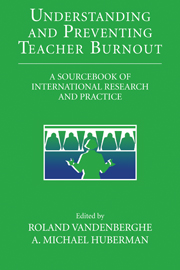Book contents
- Frontmatter
- Contents
- Contributors
- List of Figures
- List of Tables
- Foreword
- Introduction: Burnout and the Teaching Profession
- PART ONE TEACHER BURNOUT: A CRITICAL REVIEW AND SYNTHESIS
- PART TWO TEACHER BURNOUT: PERSPECTIVES AND REMEDIES
- 7 Inconsequentiality – The Key to Understanding Teacher Burnout
- 8 Turning Our Schools into a Healthier Workplace: Bridging Between Professional Self-Efficacy and Professional Demands
- 9 Teaching Career: Between Burnout and Fading Away? Reflections from a Narrative and Biographical Perspective
- 10 A Psychosocial Interpretation of Teacher Stress and Burnout
- 11 Burnout Among Teachers as a Crisis in Psychological Contracts
- 12 Progress in Understanding Teacher Burnout
- 13 Teachers' Moral Purpose: Stress, Vulnerability, and Strength
- 14 Teacher Burnout from a Social-Cognitive Perspective: A Theoretical Position Paper
- 15 Professional Identity, School Reform, and Burnout: Some Reflections on Teacher Burnout
- 16 Conflicting Mindscapes and the Inevitability of Stress in Teaching
- 17 Do Teachers Burn Out More Easily? A Comparison of Teachers with Other Social Professions on Work Stress and Burnout Symptoms
- 18 Teacher Burnout
- PART THREE TEACHER BURNOUT: A RESEARCH AND INTERVENTION AGENDA
- References
- Index
13 - Teachers' Moral Purpose: Stress, Vulnerability, and Strength
Published online by Cambridge University Press: 06 January 2010
- Frontmatter
- Contents
- Contributors
- List of Figures
- List of Tables
- Foreword
- Introduction: Burnout and the Teaching Profession
- PART ONE TEACHER BURNOUT: A CRITICAL REVIEW AND SYNTHESIS
- PART TWO TEACHER BURNOUT: PERSPECTIVES AND REMEDIES
- 7 Inconsequentiality – The Key to Understanding Teacher Burnout
- 8 Turning Our Schools into a Healthier Workplace: Bridging Between Professional Self-Efficacy and Professional Demands
- 9 Teaching Career: Between Burnout and Fading Away? Reflections from a Narrative and Biographical Perspective
- 10 A Psychosocial Interpretation of Teacher Stress and Burnout
- 11 Burnout Among Teachers as a Crisis in Psychological Contracts
- 12 Progress in Understanding Teacher Burnout
- 13 Teachers' Moral Purpose: Stress, Vulnerability, and Strength
- 14 Teacher Burnout from a Social-Cognitive Perspective: A Theoretical Position Paper
- 15 Professional Identity, School Reform, and Burnout: Some Reflections on Teacher Burnout
- 16 Conflicting Mindscapes and the Inevitability of Stress in Teaching
- 17 Do Teachers Burn Out More Easily? A Comparison of Teachers with Other Social Professions on Work Stress and Burnout Symptoms
- 18 Teacher Burnout
- PART THREE TEACHER BURNOUT: A RESEARCH AND INTERVENTION AGENDA
- References
- Index
Summary
In this chapter, I focus on values as a central component in teacher burnout. The ideas I explore were triggered in the first instance by Woods's chapter and in particular by his distinction between micro, meso, and macro levels of stress. Whereas Leithwood, Miller, and Smylie explore organizational factors (the meso level), Woods emphasizes changes in government policy and resourcing at the macro level and their impact on individuals (the micro level). I take this idea further, with particular reference to a small but highly significant aspect of teachers' lives. Woods suggests that teachers are likely to suffer stress when their “personal interests, commitment, and resources” get out of line with or pull against key aspects of their social, economic, or institutional environments. Later, he identifies a conflict in values as one of the factors leading to nonaccommodation (“the seedbed of stress and burnout”). By implication, therefore, Woods sees values as part of the “personal interests, commitment, and resources” that teachers need to protect from disharmony if they are to avoid damaging exposure to stress.
To justify this implication, in the first part of the chapter I trace the connection among the notions of commitment, values, identity, and interests. I then focus on two moral values that are a key part of many teachers' commitment and interests.
- Type
- Chapter
- Information
- Understanding and Preventing Teacher BurnoutA Sourcebook of International Research and Practice, pp. 223 - 237Publisher: Cambridge University PressPrint publication year: 1999
- 42
- Cited by

